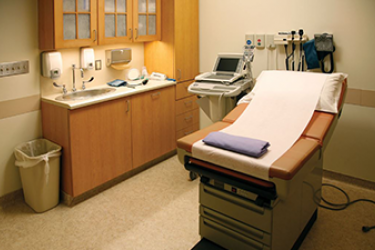Enforceable Accessible Medical Equipment Standards: A Necessary Means to Address the Health Care Needs of People with Mobility Disabilities

SCOPE AND PURPOSE People with disabilities experience much higher prevalence of preventable disease and poorer health outcomes than the general population, yet adults with disabilities continue to face significant physical barriers that impede access to health care and leads to unmet health care needs. Among the most significant barriers is the absence of accessible medical diagnostic equipment. The U.S. Access Board published Standards for Accessible Medical Diagnostic Equipment (MDE) on January 9, 2017, in consultation with the FDA, yet efforts to formalize MDE standards have been unsuccessful, leaving the MDE standards without the force and effect of law. This report supplements NCD’s 2009 report, The Current State of Health Care for People with Disabilities, which documented the effects of inaccessible exam tables and other medical diagnostic equipment.
NCD’s report provides the following key findings:
- More than 20 million people over the age of 18 years have a disability that limits their functional mobility and creates a barrier to accessing standard MDE;
- People with disabilities reported their healthcare professionals often created ad hoc “accommodations” due to inaccessible MDE that included skipping parts of the examination during which the barrier was encountered or even refusing to treat the patient due to facility’s inaccessibility;
- Medical staff are unfamiliar with the proper use of accessible MDE even when it is available;
- The U.S. Department of Justice’s Disability Rights Section (DOJ) and the U.S. Department of Health and Human Services’ Office for Civil Rights (OCR) have mechanisms to allow people with disabilities to file administrative complaints against health care providers due to inaccessible MDE, but this has not resulted in widespread change to increase the availability of accessible MDE in health care facilities; and
- The Department of Veterans Affairs (VA) is the only federal agency to require that all new equipment purchases across the Veterans’ Affairs Health System meet MDE standards.
NCD’s key recommendations to federal agencies include:
- HHS OCR should issue a regulation requiring covered health care providers to acquire accessible equipment that complies with the MDE Standards as well as develop a technical assistance document on accessible MDE;
- DOJ should revise its Title II and III ADA regulations requiring covered health care providers to acquire equipment that complies with the MDE Standards as well as develop a technical assistance document on accessible MDE and update the 2010 “Access to Medical Care for Individuals with Mobility Disabilities” to include information on the Access Board’s MDE Standards;
- VA should publish their policies and practices on accessible MDE and share this information with other federal agencies along with information on the cost-effectiveness of implementing the MDE Standards; and
- The Department of Education should develop training requirement standards that include the use of accessible MDE and require that all federally funded medical residency programs include disability competency training.
VIDEO: NCD Report Release Video
NCD held a webcast briefing May 20, 2021, discussing the release of their new report on accessible medical and dental equipment titled Enforceable Accessible Medical Equipment Standards: A Necessary Means to Address the Health Care Needs of People with Mobility Disabilities. The briefing on the report includes Andrés Gallegos, Chairman, National Council on Disability; Dave Yanchulis, Director, Office of Technical and Information Services, U.S. Access Board; Robinsue Frohboese, Acting Director, U.S. Department of Health and Human Services, Office for Civil Rights; Alyse Bass, Trial Attorney, U.S. Department of Justice, Civil Rights Division, Disability Rights Section; Clarette Yen, Attorney Advisor, U.S. Department of Justice, Civil Rights Division, Disability Rights Section; Peter Thomas, Principal at Powers Law Firm and coordinator of the ITEM Coalition; and Sarah Triano, Senior Director of Policy & Innovation, Complex Care, Centene Corporation. It is introduced by Anne Sommers McIntosh, Executive Director, National Council on Disability, and moderated by Ana Torres-Davis, Senior Attorney Advisor, National Council on Disability.

